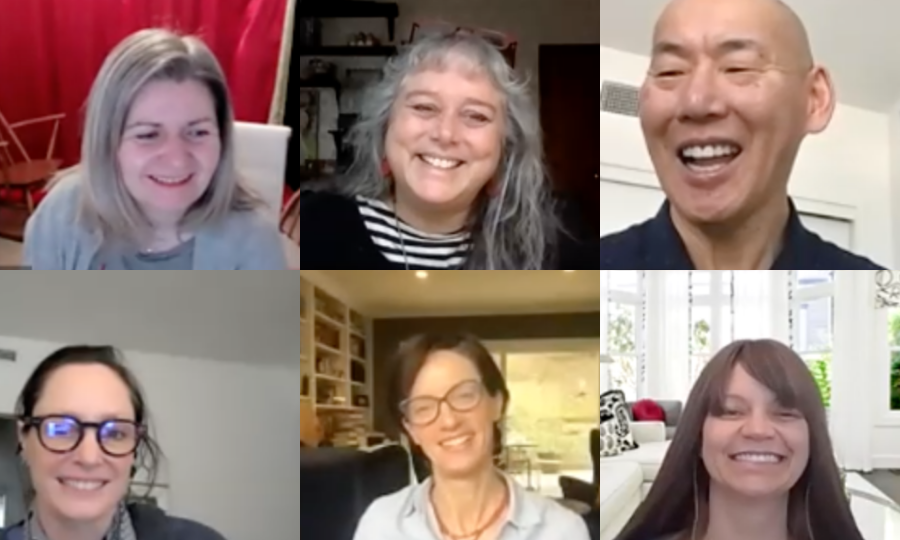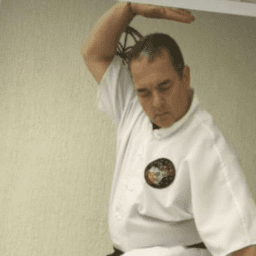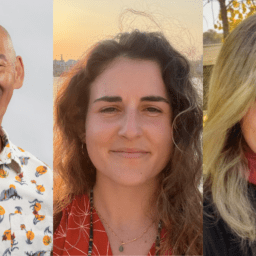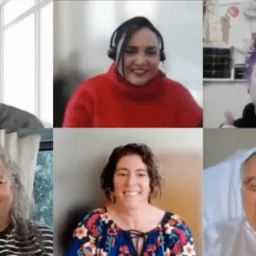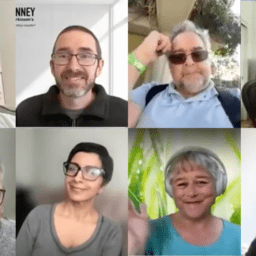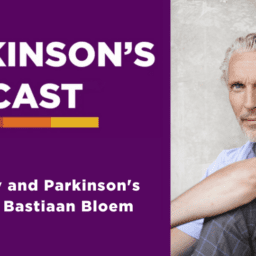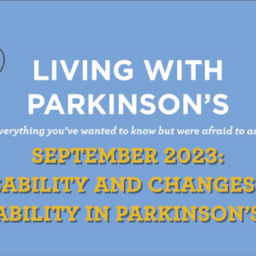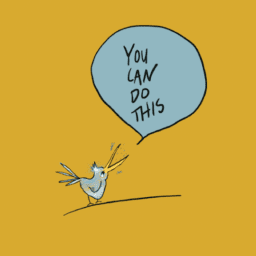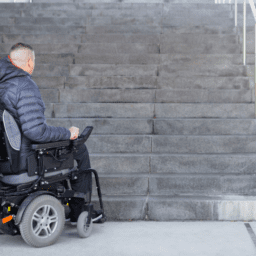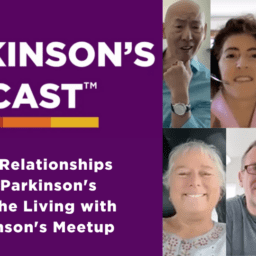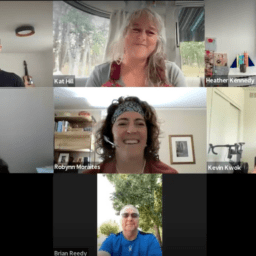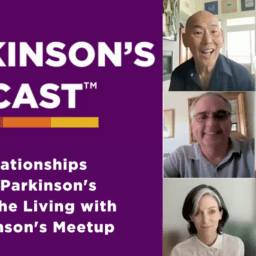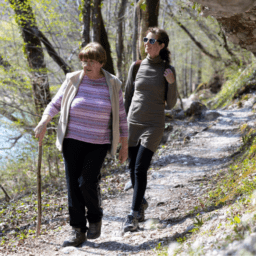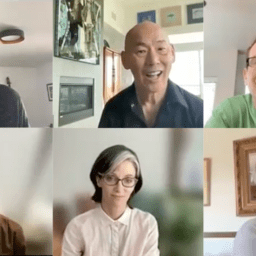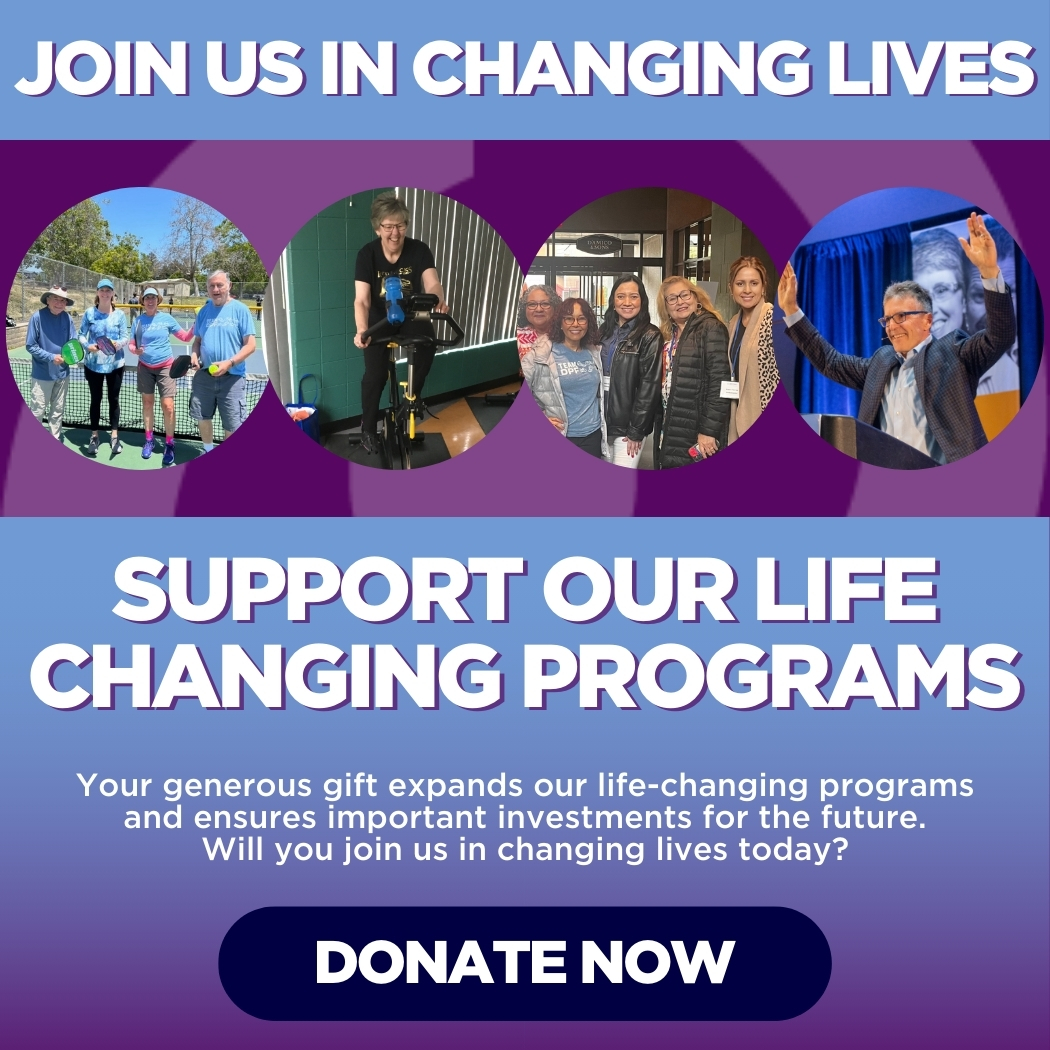Death is a universal part of life. But when faced with a Parkinson's diagnosis, this topic may have an entirely new meaning.
In this webinar, our YOPD Council leaders discussed:
- Parkinson's and its effect on their perspectives of death
- Strategies for managing feelings of loss
- How to effectively prepare for end-of-life and live well in the moment NOW
- How to have conversations with your loved ones about death
- How to re-channel your energies on things that bring you hope
You can watch the video below.
To download the audio, click here.
You can read the transcript below. To download the transcript, click here.
Melani Dizon (Director of Education and Research, Davis Phinney Foundation):
Hello and welcome everybody. My name is Melanie Dizon. I'm the director of education and research at the Davis Phinney Foundation. And today we are here for another edition of the YOPD council, monthly sessions. Hello, everybody. We have Kat and Gaynor and Erin and Amy and Kevin on today. We might have a few more people coming on, yeah, we will have a couple more people coming on. If you guys could do me a favor and look at the little icon at the bottom of your thing that says chat and click the chat box and say hello and tell us where you're from so that we know that you can see us and hear us and that all as well. There we go. Hello from Athens Georgia, you win first today, Lawrence. Hello from Saskatchewan Portland, Oregon. Hello. Sean Evans from Santa Fe, from Vancouver. Awesome. Cool.
I'm going to enable the close captions for the live transcript. So, you should see that at the bottom of your screen. If you do not want to see them throughout this session today, you can click the little arrow that's right next to the thing that says live transcript, and then say, hide subtitle. This way it won't show up for you, but it will show up for the people who want it to. Please use the chat today to talk to us if you're new and you've never been to one of our sessions before we like it to be really lively, we're happy with all the comments and questions that you want to send in. So, feel free to do that.
If you want everyone to see your question on the right-hand side, you'll see the little blue kind of button with a little arrow in it. If you want everyone to see it, you can click panelists and attendees. If you only want one person in particular to see it, or just a panelist to see it, then make sure you select that. And we will get back to you and hopefully help you out if you're having any issues. Leigh is going to be in the background, and she is our content manager and she's wicked fast with the links. So anytime we talk about a link, Leigh will have it up there and if we don't, we'll find it for you later and make sure we send it to you after the session. If you have registered, you will get the recording, the audio recording, the video recording, the transcript, and the show notes. So, if you have to leave early no worries about it. I think that is all the important to dos.
Today Kat is going to be our fearless leader in the talk of death and dying and Parkinson's, so this is a tough topic, but it's one that we all think about no matter what's going on in our lives. And I think it's a great thing for everyone to feel like they can weigh in on. And this is a safe space to talk about and ask the questions that you have. And hopefully everyone on this panel will be able to help you out and offer some insights into how they think of things and what they do in their life to make them feel better about the death and dying process. So, take it away.
Kat Hill (Davis Phinney Foundation Ambassador, YOPD Council Leader, and YOPD Women’s Council Leader):
Thanks Mel. Thanks everybody for joining us today. So, I'm going to start off by saying, you know, that I'm not an expert in this area, but I think it's a universal experience for all of us. We will all live, and we will all pay taxes probably, and we will all die, right? Nothing is certain but death, and taxes. I don't remember who said that, but I have had the privilege of being with my mom when she passed. She was involved in hospice care at the end of her life. And my dad also died in hospice care. And so those are my two primary closest experiences. As a nurse and as a nurse practitioner, I of course was exposed and participated and saw death quite often in the hospital. Although as a midwife in my later years, I saw less of that, but it doesn't mean that there's not grief and loss around reproductive health.
I'm going to pull from a book that I think is really, really valuable and it is by Atul Gawande, “Being Mortal: Medicine and What Matters in the End.” And I think this is really well-done book. Atul is a palliative care doctor, and he talks about his experience of being a physician and also going through the process of his dad's death and dying. His dad was also a physician, which is interesting. So, I was going to kick things off and just read a couple paragraphs that I think summarize well kind of where we are, and then I'm really going to open it up to discussion. He writes, “Modern scientific capability has profoundly altered the course of human life. People live longer and better than at any other time in history, but scientific advances have turned the process of aging and dying into medical experiences, manners to be managed by healthcare professionals. And we in the medical world have proved alarmingly unprepared for it. This reality has been largely hidden as in the final phases of life become less familiar to people. As recently as 1945, most deaths occurred in the home. By the 1980s, just 17% did. Those who somehow die at home likely died too suddenly to make it to the hospital, say from a massive heart attack, stroke or violent injury, or were too isolated to get somewhere that can provide help quickly. Across not just the US, but also the entire industrialized world, the experience of advanced aging and death has shifted to hospitals and nursing homes. So, on that note I would like to hear anybody that feels like sharing. And before I dive into some of the content pieces and some of the nuts and bolts of things that you can prepare for, does anybody have any thoughts on that?
Kevin Kwok (Davis Phinney Foundation Board of Directors member and YOPD Council Leader):
I think that this is one of those topics, which you don't find a lot of glee and joy, but it's one of those things that if you have the conversation now, instead of in the end stage, I think you actually find it, the antithesis of being doom and gloom, but actually very uplifting. I don't know if others on the panel agree with that.
Kat Hill:
I definitely agree with that. In my experience with my mom, my mom had three independent cancers, three different times over a matter of 22 years. And we had a lot of discussions about what a good death would be like for her. And those were hard conversations to have, especially when I was younger in my thirties. I was better prepared for it in my forties. But I think that she felt a sense of peace when it was finally her time to pass, because we had talked so much about it. She felt like her wishes would be honored. And I think that that's a really important step that we need to touch on today. And that is if people have ideas around what they want or don't want done at the end of their life, it's imperative that they write it down and get it documented.
And probably everybody's been asked when they go to their doctor's appointment, do you have an advanced directive, right? We’ve all heard of those. There are also things like power of attorney for medical decisions. You can actually appoint somebody who can be your decision maker at the end of your life. And obviously it's really important to have conversations with that person about what you want and don't want. I had power of attorney for both my parents, for their medical decisions. My brothers were very happy about that. But we all knew what our parents wanted and those are actually legal documents that can be shown to providers to help you advocate for the people that you love. So, I think it's really important. And as we all age, we're all gonna deal with this. And some of us may be dealing with our parents or grandparents, but we someday it will be our turn to deal with this. And we need to think about what we want at the end of life.
Erin Michaels (YOPD Council Leader):
Yeah. I was going to add to that Kat. I think it's an interesting dynamic that we face. So probably a lot of people on the panel and a lot of people in the audience we're conditioned right away that when you've been diagnosed, it goes through your mind, oh, my God, I'm not going to live as long or have a quality of life as everybody else does. But if you look at it from a different perspective, it's kind of, I don't want to say it's a good thing, but the positive in this is that because these things have happened to us, we can have more ownership of our ultimate destiny. So, we're thinking about things that I don't want to say the typical population, probably isn't thinking about until much later in their life, but they don't come up until typically there's a reason for, unless you're just an exorbitant planner or you've got somebody who in your life has taught you that you should be planning for these things upfront.
So, I think that there's a lot of empowerment in that. And having those conversations and being able to say, this is what I'm thinking about. I still have time to do research on what that means, whether it's, I want to donate my body to science, what does that mean? Where does my body end up? Do I want to, you know, go into the mausoleum? Do I want to be cremated? Do I want to be shot into space? You can look through all of the pros and cons and kind of have more I think facts going into whatever decision is going to work for you and your family. So, it's a unique position. And I do think there is some positive in it.
Kevin Kwok:
You know, you get some very interesting issues of culture and upbringing when you start talking about this topic and we all come from very different backgrounds. In some cases, you know, talking about death is a taboo and in other cultures it’s actually greatly appreciated it. You know you hear your grandmother talk about her plans, you know, when she's six years old.
Kat Hill:
Somebody brought up a really good question over in the side here about wanting to fight the disease and not wanting the plug to be pulled too soon. But don't want to have an extended life either. And I think that a lot of us feel that way and it's all about quality of life. So Heather, I'm going to let you chime in here.
Heather Kennedy (Davis Phinney Foundation Ambassador, YOPD Council Leader, YOPD Women’s Council Leader):
I think Gaynor might've been ahead of me, so I'll let her have her thought first and then I'll jump in.
Gaynor Edwards (YOPD Council Leader, YOPD Women’s Council Leader):
Well, okay. Thank you. I think Erin made a very good point and the Parkie perspective. I think, you know, we've dealt with grief and, you know, the normal pathways of grief when you actually get diagnosed. So, obviously not to the end’s degree, but you've kind of dipped your toe in those waters. So, I think that’s kind of helpful in itself. And a lot of people, I think the trigger for a lot of people with young-onset Parkinson's tends to be great for major illness of a loved one. And I'm not conveying this very well, but you get my gist.
Kevin Kwok:
I like to take sort of the Japanese samurai view of life, and it ties to the conversation.
The last question that was just brought up was that they want to fight. I don't think having a conversation about the end stage and the last moments of your life is a defeat on life. In fact, if anything, you want to live life more fully and having this conversation actually allows you freedom to kind of liberate yourself to say that I will fight to the very end, but when it's time, I want to go with dignity. And I think that's a really important part, but you have that conversation at the right time. To have that conversation with the newly diagnosed Parkinson’s patient is probably a little too early, but those of us that have lived around with it for a decade or more, we start to see other turns of this journey, right? I mean, I'm coming off of a particularly difficult last quarter where I lost my brother to cancer. My next-door neighbor, who's actually a DPF ambassadors’ husband, and a good friend of mine died of MS. All within like three weeks. And I was able to be at two of those places, one at the person's bedside while they were going through this very dignified exit in life. And to me, I was like, these people get it right. They figured out how to go with dignity. It's no sacrifice on their life. All three of these people live life fully up until the end.
Gaynor Edwards:
What do they say, Kevin? The only thing to fear is fear itself.
Kevin Kwok:
My brother actually had a saying, “I don't fear death. I fear not living well.”
Kat Hill:
I love that. I love that. Heather, you want to chime in love?
Heather Kennedy:
I'm just echoing exactly what Kevin was saying. And Kevin, you have been a remarkable inspiration to me during this time of loss and grief and change. So, thank you so much for showing by example how to do so with so much grace. I also wanted to say death and taxes, you know, “Memento mori,” and I'm getting the “memento mori” tattooed on my skin to remind me, of course, we're all going to die. We're all just walking each other home, like my favorite quote of all time, I feel like I've been preparing for this for a lifetime. My grandmother was crippled when I knew her. Two of my grandparents were dying from the time I can remember. I've lost so many friends and I watched my father died very slowly. And I think it's part of the process. This is why I spend a lot of time focusing on spirit and soul. I'm not proselytizing, I’m not talking about religion. I'm talking about impermanence as a philosophy. Following, for example, the teachings of somebody like, I don't know, Pema Chodrin, or someone who talks a lot about impermanence and getting comfortable with that and then running a death cafes at my house too. And I'll talk more about those later maybe, if we have time. Thanks.
Kat Hill:
Yeah, I have another quote from the book that I love. Zen says, “You live longer only when you stop trying to live longer.” And I liked that. The work of it, the letting go, the surrender.
Erin Michaels:
I saw a question in the comments that I wanted to make a comment on. So, Dwight, I think from Wichita. So, you were asking if there is a significant difference between people with PD compared to the general population in terms of death and dying. And I'm only going to answer this for myself and others can chime in. For me specifically, I don't think it's different than other people, but what I notice is from day to day, week to week, month to month, I can feel my body changing. I can feel the disease progressing. I don't want to say progressing, but different aches and pains and things are becoming a little bit more challenging than they used to.
And it's just because I can feel it affecting my body and my day-to-day activities and my overall wellbeing as a person, it does cross your mind because then you say, okay, so now I have this new tick or this new ache, this new pain does this mean I'm progressing? Does this not mean I'm progressing? Is it a reaction to my medication, is it a reaction to something else? So, your mind kind of can be your own worst enemy. At least where I'm concerned, where the disease does start to progress and you kind of get into that pitfall of, okay, am I advancing faster than I anticipated? Am I not? What's really causing this? So, it's kind of, you have to figure out when to stop that mental mind game and you can focus on what's wrong and what's not working or figure out how to pick yourself up and find a new way to work through it and realize that it might not be the disease.
It might be the disease, but you know, I'm only 44, so I can either dwell on it or kind of move on. But I do think it's something that at least I think about as my days go on and, you know, work becomes a little bit more challenging, and you know, typing's become an issue lately. Things just creeping up that weren't there day one. So that's just my 2 cents on it. I don't know if anyone else has anything to add, but.
Kat Hill:
I think so much of what we talk about here comes down to choice, right? And where you put your mind and what's the saying, “Life is happening while you're busy worrying about something else.” And so, you know, life itself is progressive and degenerative and those of us that have a diagnosis have an opportunity sometimes to reflect, and it feels sometimes a little bit more like we've talked about the grief and loss that go with having a progressive disease that is sort of incremental as our bodies don't work the way they used to. We are grieving in that, but I think being stuck in grief can mean losing out on living once you've grieved, you have a choice to move on from there and come to the living part. And I think for many, especially at the end of life, being able to say and discuss with your loved ones, what your desires are, make it easier to be more in the moment as you live those last few weeks, months, years of your life, because you've been able to grab a hold of it and share what you want.
And Kevin, you had a thought, and then I'd love to hear about the death cafes too. So, I'm gonna mute here. Go ahead Kev.
Kevin Kwok:
Yeah, have any of you been to a palliative care Parkinson's specialist. I went there for the first time in December for my first one, and it's a completely different appointment than going to see your regular Parkinson's traditional neurologist, you know, instead of doing a UPDRS assessment on that moment in time, the first conversation is almost like a two-hour conversation on values. Where do you want to be? Where do you want to go? And I have to say that that was probably one of the more refreshing, rewarding two hours that I've spent. I mean, we ended up filling out a form and every state's different, but we fill out this really hideous lime green form, which goes to my medical chart, which is my, basically they use the term advanced directives, but for me, the conversation was initially, I don't want to be a DNR, do not resuscitate me, but it was actually really meaningful to really tease what DNR really means. Is that really what you want? I saw a comment from one of the attendees that they want to fight, and I'm the same way I will fight to the very end. And I was thinking to myself, if I got in a car accident, I want someone to try to resuscitate me, for sure. But what I don't want to be is a vegetable, you know, with my DVS pulled out and just paralyzed with a life support system. That's a very different living. And so, we had the conversation and filled it out, according to my directives, and I think every state is different. So, this form in Colorado is called the MOST form, but I'm told that various states have different rules and laws about advanced directives. She even used the term assisted suicide, which is kind of a very negative term for most of us, but we kind of know the gist. Some countries, and I'm really curious, you know, in Gaynor for you and in the UK, what's it like because it's difficult to get assistance. You're better off having a dog and putting your dog down than you are your loved one.
Gaynor Edwards:
Just checking he wasn't underneath my desk then. No, you're right. I know it's a contentious issue wherever. But because we've had cases, serial killers, for example, there was a case with Harold Shipman, and he put the cause back so much further. I think there's an awful lot of people that would like it properly addressed and would like the option. But you know, we have to work out how to go to Dignitas in Switzerland. That's usually the kind of way around it, but there's something about, you know, if you address death as someone with a chronic condition, then you're kind of free to get on with life aren’t you, which is kind of the point, isn't it? Deal with it and then get on with every day,
Kat Hill:
Indeed, Amy, you had something
Amy Montemarano (Davis Phinney Foundation Ambassador, YOPD Council Leader):
Yeah, really quick. And then I want to hear about Heather's death cafes too. But to Gaynor’s point and everybody else's point too, I wrote about this in one of the blog posts that I wrote for David Phinney. But right after I was diagnosed, a woman who I know, we walk our dogs together sometimes in our neighborhood. I told her and her response was, “What a gift you've just been given,” which sounds kind of offensive to some people. But I understood her answer. She had just nursed her mother through Alzheimer's and what she said was, “What a gift you've just been given. You just had the veil lifted and not many people have that opportunity to understand how precious your life is right now, right this second and your relationships.”
And so that was really eye-opening for me. I loved her response, and it came from a place of real experience and authenticity which goes to Kat what you said. I think a lot of it depends on where you put your mind. And also, a lot of it depends on these kinds of conversations. But I think that these kinds of conversations are really hard to have with your family first and trying to figure out what words to use and what you want, it's really good to talk it through with other people maybe palliative care practitioner or just, you know, in a death cafe or something before you talk about it with your family. So, you're good with the words and the linguistics that you're going to use.
Mel Dizon:
Heather, I'm just gonna cut your death cafe off one more second, because I just wanted to talk about what Amy said. So, one of the most fascinating things was a couple of years ago, we did a Victory Summit event in Seattle. And we were kind of going back and forth about what breakout sessions to have. And one of them was a woman who specializes in advanced directives. And we were like, is this something that people, you know, is it something we want to have at the Victory Summit? Is this the right place for it? We ended up having it and it ended up actually, everyone kind of went in there feeling like, how are we, how is this going to go? Is this going to be really upsetting? It ended up being one of the most like uplifting sessions of the day and the woman, well, she was a fabulous speaker, first of all, but second of all, she really helped on that aspect, Amy. She said, you know one of the things that you could do is when you're going to have, it was, we were coming up on the holidays. So, she was like, have Thanksgiving dinner, and you know, pass this sheet around. And she gave us the sheet and it was basically she would ask everybody in the audience a question, and then you would say thumbs up or thumbs down. And everybody was looking at each other thinking, oh, I didn't know you were to answer it that way. I thought you would answer it this way, but it wasn't really severe and heavy. It just opened up the door to those questions. And I think that that was a really interesting way of presenting it.
Leigh put the link up to when I wrote about that experience, but I think that's such a great point to, you know, get comfortable with the language and your people are gonna mirror your attitude and your vibe with it, right? So, if you go in there and think this is okay, everybody, this is what I want to talk about. It's super important to me. They're going to look at you differently than if you go in and this real heavy and like, oh my gosh, I can't deal with it. All right. Death cafe, you're on.
Heather Kennedy:
So, the death cafe is not about grieving and it's not necessarily therapeutic. It's to help people deal with their finite lives and make sense and purpose of things and just to share. So, it's a guided, not for profit meeting that you organize in a community in a very personal and private space. It can be held in a cafeteria as the Swiss sociologist used to do. I think his name was Bertrand Critaz, or something like that. Bertrand, Cortez, I don't know how to pronounce it. And he started these cafes because he wanted someplace where it could be spoken of, and he wouldn't be sort of accosted as get over it or get past your grief. You know, when you bring up uncomfortable emotions with people such as trauma or grief, a lot of people are uncomfortable for a number of reasons. Maybe they want to rush you along and grief doesn't have a timeline, obviously.
And you know, none of it does. Nobody can tell us what our timeline is. So, it's nice to join in with a community of trusted souls. You know, it's a little bit like AA, I imagine, where you just join, but there's no donation or anything. Usually, it's tea and cake. You meet in the cafe. You talk about your experiences with death and therefore you have greater purpose to live longer because whether we've watched someone die or whether we were young, and we saw that open casket with our friends, big, strong dad and the casket thinking, how could this be? This fragile body? You know, this disillusionment that you have all mentioned of being mortal and finite as we all are, is pretty extreme sometimes. So, the death cafes are wonderful. And I've been doing this for years in my home around my dining room table. So, you know, everyone's invited to join. Of course.
Kat Hill:
We'll have to have it virtually Heather, a virtual death cafe. I think death cafes can be a great tool to help you get comfortable with the language, but also learn about purpose and maybe how you want your own death or end of life, to look like, what you want it to look like and hear about other's experiences. I think it can broaden your world and maybe help give you the language. I wanted to touch on something that Kevin talked about and that was seeing a palliative care specialist or palliative care neurologist you saw. Right? So, everybody thinks of palliative care as end of life. It's really not about end of life anymore. And we're trying to change. We want people to be thinking about palliative care as quality of life.
The doctor was having discussions with Kevin about what he wanted, what his philosophy was, what his ethics, I'm putting words in your mouth Kev, but those are things that we should, ought to, might want to think about as we are living. And so palliative care can help us navigate and define how we want to live and live fully. It's not just about navigating the end of life. And at the world Parkinson Congress, there's going to be some content around this specifically and trying to broaden how we all view palliative care. And I think it can be a tool that maybe we should access sooner, especially if we’re not sure about what we want. It may help us clarify what we want and there's, you know, there's mental health care providers that can help us do some of that processing too, but I'd love to see us accessing more of those tools sooner. And I'd love to hear a little bit more Kevin, about your experience too if you’re comfortable sharing.
Mel Dizon:
You're muted, Kevin, can’t hear you!
Kat Hill:
Kevin you're muted.
Kevin Kwok:
So, on the form that I filled out, it deals directly with quality-of-life Kat. So, you were right about that. It says, I just don't want prolonged life support if there is no chance of returning to a quality-of-life state. Now that's a pretty ambiguous, broad thing that you can drive a truck through, but at least it sort of gave me peace of mind. Then we went on to talk about you know, in this country, or in Colorado, how you would actually go about ending life. So, it was a really in my mind, not at all a doom and gloom conversation, but it was truly one of the better appointments that I've ever been to actually, and I encourage everyone to go see a palliative care doctor.
I'm not saying that that's your only point of contact, but what it does is it looks at the, instead of a snapshot of where you are, you know, on February 15th, what it looks at is the continuum of care and takes a team approach on, maybe you need to speak to so- and-so, you know, in our physical therapy department or a sleep lab or in our GI clinic, but they sort of act like a, what's the right word, like a foreman in your health care. Now it's only been my first appointment, so I don't know where it's going, but at least my first appointment was very positive.
Amy Montemarano:
I have a very concrete question about that and that is, are they covered by insurance?
Kevin Kwok:
Well, I haven't gotten the bill yet, so
Amy Montemarano:
Right. I mean like, do you need a referral? And if so, like what's the criteria for that? I never thought about that before, but I have to look into that.
Kevin Kwok:
In this particular case, my traditional DBS neurologist said, would you like an appointment? I can give you a referral. I encourage you to go see, you know, the palliative care and they rotate, they cross cover each other. So, I think I'm covered, but it's a very good question.
Kat Hill:
It's a great question. And I think Amy, that brings up a very, very good point. And I think in my experience, it required a referral for my dad. And he was not billed. It was paid for by Medicare. He was in California, so, it may vary, but I think it's important to ask that question. But I also want to clarify too that palliative care is not the same thing as hospice. Those are different terms and use. Palliative care can be about quality of life and living and continuing to pursue treatment and incorporate all of those pieces.
Hospice is usually invited in when somebody has decided not to continue to pursue active treatment of disease. And I think that's just a distinction that I wanted to make. Let's see. I have two hands, Gaynor. It's all yours.
Gaynor Edwards:
I think one of the other things that we need to consider is if we don't process this and we don't address it for ourselves, it might suddenly land in the lap of our significant other, or, you know, it needs to be our decision and we need to make our wishes clear. I mean, I've been in this situation where my best friend I was living with him, he died of cancer and I was watching him as his cancer progressed. And there were times where if he seemed positive, that seemed like that's the opportunity for me to ask an awkward question, but then of course that was, oh, you've really, you've really depressed me now. Right. But I can't ask you the question when you're depressed and trying to actually say, you know, what do you want? What do you, you know, what do you want me to do when push comes to shove? That's the wrong phrase, but you know what I mean?
Kat Hill:
Yeah. That's an excellent point. Gaynor. If we don't make the decisions for ourselves, somebody else will make them for us. Heather, you were up. And then Kev.
Heather Kennedy:
I just wanted to add that many people make the mistake of thinking that hospice is a business, instead of a program. So, the hospice range can vary greatly depending on what nurse you get and where they are registered, how they registered and in what form they registered. It's about as different as if you were going to get married and you wanted to choose someone to marry you, you know? So, it's within the same program. They have to be obviously, you know, they have to get qualified, but it's just, hospice is not a catch all for everything too.
Kat Hill:
And you know, you can interview hospice and talk to hospice before you're ready for them. We did that with my mom and went through the process and ask the questions. When should we call you? And it was all lined up. My mom was actually only in hospice for three days. But we talked to them sometime in advance. Kevin. Yeah. You had your hand up.
Kevin Kwok:
Yeah. I was just seeing that Gaynor has a glass of wine and I'm jealous.
Kat Hill:
It's late in the day in the UK.
Gaynor Edwards:
Kevin, you will notice I always have a glass of wine.
Kevin Kwok:
I was really curious though, and I'd love to get the panel view on this, the statement, and I’ve brought this up with my palliative care neurologist. I personally hate the term that you don't die from Parkinson's you die with it. And she said the exact same thing. She goes, that's horrible definition because it does a disservice to those of us who are trying to live and charting our course. Right? And she said, death definitely doesn't occur with Parkinson's or secondarily. It can cause some other complication that might end up, but it's not something you want to labor over. Will I die from Parkinson's? But just being able to acknowledge that this is something that will eventually end in a way that you, and how you handle it is to me really important. So, go ahead, Kat.
Kat Hill:
Yeah, I have, you know, my dad qualified for hospice care with a Parkinson's diagnosis. He died probably from pneumonia secondary to aspiration, however, his death certificate said he died from Parkinson's. So, I take offense with that issue too. Now, having said that I also could easily get hit by a bus. And that could take me out, but I think that we need to be careful about how we fuse those cute little sayings that none of us seem to like. Gaynor, how about you, babe?
Gaynor Edwards:
Well, so it's interesting we don't die of Parkinson's, we die with it. And yet the figures from the world health organization would appear to say otherwise, you know, is this for the benefit of insurance companies, because is it a different deal? If it's a terminal diagnosis compared to a chronic diagnosis? Just saying.
Kat Hill:
We would have to know who runs the world. And I think that right now, insurance companies, I think are running the world a bit, so, so anyway, I'm sorry, Erin go ahead.
Erin Michaels:
It’s okay. I just have a question for the panel. It's something that I've not yet experienced myself. So, I'm going to throw it out there. How do you incorporate this piece of the puzzle into your care plan for Parkinson's? Is it something that you've defined once and put it away? Is it something that you bring up, you know, once a year and kind of revisit and see, has my thought process changed? Have my plans changed? Have my values changed? Or is it something that for the most of us, we just want in down and you just put it away and don't think about it again.
Kat Hill:
Kev, you want to take that one?
Kevin Kwok:
So, what they told me is that this document is not etched in stone. You can change it at any time. You can change it verbally. So, it's not a binding contract. And I think that gave me a little bit of relief as well, because I didn't want to sign something that says oh well now I'm going down this path, right? So, to answer your question again, state-by- state might have different laws, but I'm thinking that the more progressive states, they're not going to hold it if you change your mind.
Kat Hill:
I know that we recently put together our trust and all of our documentation. And partly after reading the “Being Mortal” book, because I think we wanted our kids to have a sense of what we want at the end of life and have paperwork filled out. I believe strongly that part of living is, at least for my family, trying to model living and also the hard parts, which will be end of life also. And I think tabbing those conversations and making them more normalized. Now, we're a family that’s been talking about birth control at the table since my kids were in kindergarten. So, we've had some practice doing that, but I think those are important things to start thinking about if you have strong feelings about it.
Kevin, you have your hand up. Do you have a?
Kevin Kwok:
Oh, I'm sorry. That was an old one. Okay. Let me take it back.
Amy Montemarano:
It’s an interesting mix, isn't it? Because it's spiritual, it's philosophical, it's really concrete, legal and financial, cultural, and some of it you need outside people to help you with, and some of it has to be completely internal and most of it has to be, you know, shared with your loved ones. So, it's really hard to know how to approach it, how to start it, because it has so many moving parts.
Mel Dizon:
One of the things that that other session was really helpful was they actually asked, we probably had 50 people in the room, and they said, you know, how many people know who the first person is that would be responsible for you if, you know, if you didn't write it down and everybody got the first and second people, right. Then after that they got them wrong. And they were just devastated to find out who might've been in that line legally. And so that's something to just really think about when you're looking at your papers, you know, look for your state and have it say, like, what's the order. For some people in that room, they said the fact that I found out that this person was going to have a say is the thing that made me, you know, take action and, and make sure that my paperwork was in order. It doesn't seem like a big thing, but it ends up being a big deal.
Kat Hill:
Yeah. Interesting, interesting. It's somewhat about getting affairs in order, I think. And, I think for me having those in order gives me peace of mind and I can get back on with the living. And so, I don't know whether we really answered your question, Erin. I think that we will revisit it from time to time. I honestly don't expect a lot of it to change. It will change as we get older and hopefully live very long lives. And it depends too, you know, if we move out of state, if you know all those things, but yeah.
Gaynor Edwards:
And you know why wouldn’t you want to organize your own funeral?
Kat Hill:
You know, my mom wrote a poem that she wanted read at her, she did not want a funeral, she was cremated, and we had kind of a private family ceremony and I read her poem and that's what she wanted.
She didn't want a lot of tears, but it was, it was special. And it was helpful to have closure. For a lot of us, it's been hard, I think with COVID, people losing loved ones in terms of how they're able to honor him and the things that we count on so much for grieving and coming together and celebrating life has been difficult. And I think that in the end of life, I hope to be celebrating a lot. Kevin. Yeah.
Kevin Kwok:
Yeah. I've termed a new word. It's called zoom eulogy or Zoeulogy.
Kat Hill:
I can't help but do this because as many of you know, I was a midwife for many years and helped bring over 800 babies into the world. And I've had the honor of being with several people at death, and really those transitions have so much in common. They're big, they're powerful, they're messy. They're intense and they're very personal and they can be really beautiful and really peaceful. And I think that that's what I'd want my kids to know, that I'm not terrified of it. And that it's been a privilege for me to be able to attend people both at birth and at death.
Kevin Kwok:
You know, I have a friend who used to be a critical care pulmonologist, and I used to always say to him, how do you deal with death? Every patient you see dies. And he said, come with me. And he pulled me into his back private office, and he showed me, it was just a room decorated with thank you cards from family members. He says, I don't deal with death. I deal with another stage of life.
Kat Hill:
It really is an honor to be present for people in those moments and those intense moments and they can be beautiful. Okay, good. There are some hands, cause I'm tired of hearing me. Go ahead, Heather.
Heather Kennedy:
I was just going to say that one of the last things to go, or so I hear, happens to be hearing and it was such an honor, you're right., Kat, I'm going to echo you here to be with my father and I'll share something intensely personal because I believe that death itself is not so personal. One of the last things I said to my dad was, you have been such a great father. I have learned so much. We will take care of mom. I promise if you want to go, we'll be here with you. And if you don't, if you're not ready, you know, do what you gotta do. Dad, I love you so much. And I think that if we all had the opportunity to do that with each other, you know, we hear a lot of things about eulogies and in the aftermath. And we say these beautiful things about people. I want to hear it now, you know, and I want to tell you now so that I don't miss that chance and I can come off a bit much, people will be like, why are you telling me you love me seven times a day? And I'm like, just because. You know, I want to make sure the last thing that I say to somebody isn’t rough. Cause I've done that before too. So yeah.
Kat Hill:
That's beautiful, Heather, thank you. Yeah. I see hands, Gaynor and then Erin.
Gaynor Edwards:
There's definitely something about giving people permission sometimes. It's, you know, I did that with my best friend, with the seven years of cancer. Ad you’re right, that, you know, that they can hear. And you know, it was, it was so painful to watch him and to just say, it's okay, Johnny, you don't have to keep fighting. Let it go if you need to. They just need the permission.
Erin Michaels:
Yeah. The only thing I was gonna add Kat, I think one topic that we haven't touched on yet is care partners. So especially with young-onset Parkinson's, you know, getting these plans together and everything, I would assume some people much like myself have had friction with their care partners where they don't want to talk about it because being diagnosed not only impacts your life, but it impacts the plans that they've had, you know, and what they were expecting to live, you know, a prosperous life and they need to go through their own processing of what's going on as well. So, I'm just interested for the team. If you've had experience dealing with talking about these things and having any friction with care partners and how you've kind of worked through some of that, if it's happened to you or even anybody in the audience.
Kat Hill:
I have some very, very strong feelings about what I don't want him to do. And so, we've had some discussions about ways that we can be creative to get those needs met, but by him not doing it, I'm a little stubborn. Kev, over to you.
Kevin Kwok:
I would agree with Erin that it's a difficult conversation and it probably ended up in my first divorce in some ways indirectly, because it was such a barrier, this idea that I don't want to be taken care of and pushed around in a wheelchair and it chased away my partner back then, because their comment was, that's my choice, not yours. So, I thought that was an interesting learning, but in the few minutes that we have left, I did want to bring up thing that was kind of my observation when Gene passed away last month from Parkinson's and what he did was, I was at his bedside holding his hand, you know, as he was in his last hours. And what I noticed with the family was he decided that he was controlling his life all throughout his 77 years. But at the very end, he did something that I thought was really, that gave the whole family pride, he donated his brain to science afterwards. And it's something that's a really complicated conversation to have with someone when they're in their late stages. And you have to harvest your brain within 48 hours when you pass. So, it's really something that you want to take care of, you know, when we're in the stage of planning our advanced stages, if it's something you desire. But to me, the family, when I went to the Memorial service the family were saying, even in the end, he wanted to benefit the tribe.
Amy Montemarano:
Yeah, real quick. My father had what I would characterize as a good death in the sense that he went very quickly from a condition that he had had several years before. And he had a really great day with his grandchildren and with his model airplane flying buddies. And he was sitting in his favorite chair with my mom, just futzing around and a blood clot got loosened and stopped his heart. Way before we wanted it to, but what I learned later is that he knew that something was wrong, and he didn't tell anybody on purpose. And to me that gave me a lot of comfort because to me that meant he had some agency over what was happening to him at the end. And as hard as it is, in those circumstances, that that particular piece of knowledge just made me feel really good. It still does. And I think what we're talking about here, all of it is about having a little bit of agency over what happens at the end and not just for ourselves, but for our loved ones, because if they know that we've had a little bit of control, it's so much easier on them. It is for me anyway.
Kat Hill:
Yeah. That's really well stated, Amy, thank you, Kevin. You have something to add?
Kevin Kwok:
Yeah, no, again, I forgot to lower my hand.
Mel Dizon:
And also, someone asked about different locations to donate your brain. We just did a post about it, actually about him donating his brain. So, you can check out there and there are six different places across the country. So definitely check it out.
Kat Hill:
I'm not sure if they're going to want mine.
Mel Dizon:
Oh, they’ll definitely want yours.
Kat Hill:
Is it egotistical to think they'd want it?
Mel Dizon:
Totally fine. You have an in-demand brain.
Kat Hill:
All right. We have a couple of minutes before we wrap up, does anybody have any last pearls of wisdom to share? I hope this conversation has not been as difficult as we all thought it might be, including me. And I think I feel excited that there are providers out there that are willing to have discussions with us around this. I feel excited that there are homes like Heather's where we can sit around a table eventually and have cake and tea and have hard conversations. And I feel grateful to Davis Phinney for giving us the opportunity to come on today and talk about it. And again, next year I'd like to choose different topics.
Gaynor Edwards:
We all seem to be smiling though Kat.
Amy Montemarano:
That’s because you have your wine.
Heather Kennedy:
I’m rocking but that’s from dyskinesia.
Kat Hill:
All right. Well thank you everybody for giving us your time today. And as always thank you to all of my friends and panelists and for getting us through this discussion.
Mel Dizon:
Bye everybody, we'll send you the recording and everything in the next few days. Have a great day. Bye.
Show Notes
- It is important to talk to your loved ones about your end-of-life wishes early. By having this conversation, you are not “giving up” but rather, preparing early so that you can live life to its fullest
- End-of-life planning includes completing an advanced directive (a legal document that allows you to make your end-of-life wishes known in the event that you are unable to communicate)
- Our panelists agree that even though their Parkinson’s diagnosis brought its own grief regarding their end-of-life, it also “lifted the veil” and allowed them to accept the future while living fully in the present
- Palliative care focuses on how to help you live well with your diagnosis. A palliative care physician may ask you about your values, ethics, and what’s important to you in order to live well throughout the progression of your diagnosis
- Death is an inevitable part of life that everyone will experience. Events such as “death cafes” seek to increase the awareness of death to help people make the most of their finite lives
resources and topics discussed
Care Planning For A Parent Living With Parkinson’s
“Being Mortal” by Atul Gawande
[Webinar Recording] Holistic And Supportive Care For People Living With Parkinson’s
The Conversation Project (A resource to help start the conversation about end-of-life planning)
Donating Your Brain To Science
WANT more advice from our yopd council?
You can register for the entire YOPD Council series here, as well as catch up on recent conversations. We meet on the third Thursday of every month to discuss the unique challenges of living with YOPD.
Join us for our new YOPD Women Series
During our monthly YOPD Women sessions, we’ll address the many issues unique women living with YOPD with the help of doctors, specialists, and our YOPD Women Council leaders. Register today and join us for these lively, interactive, and truth-telling monthly sessions.


